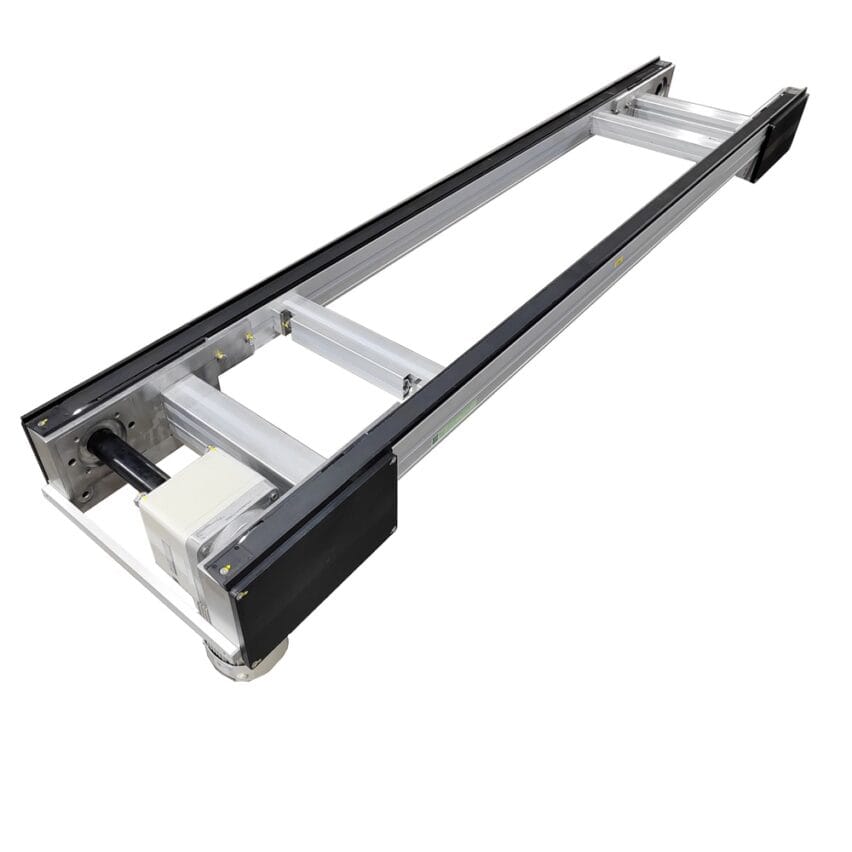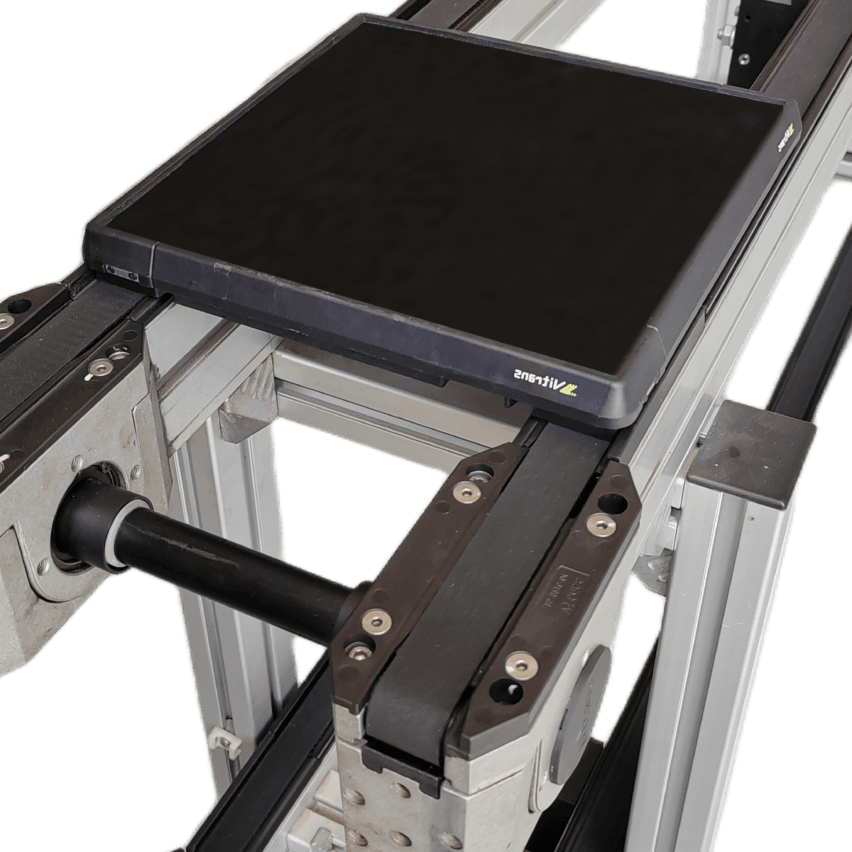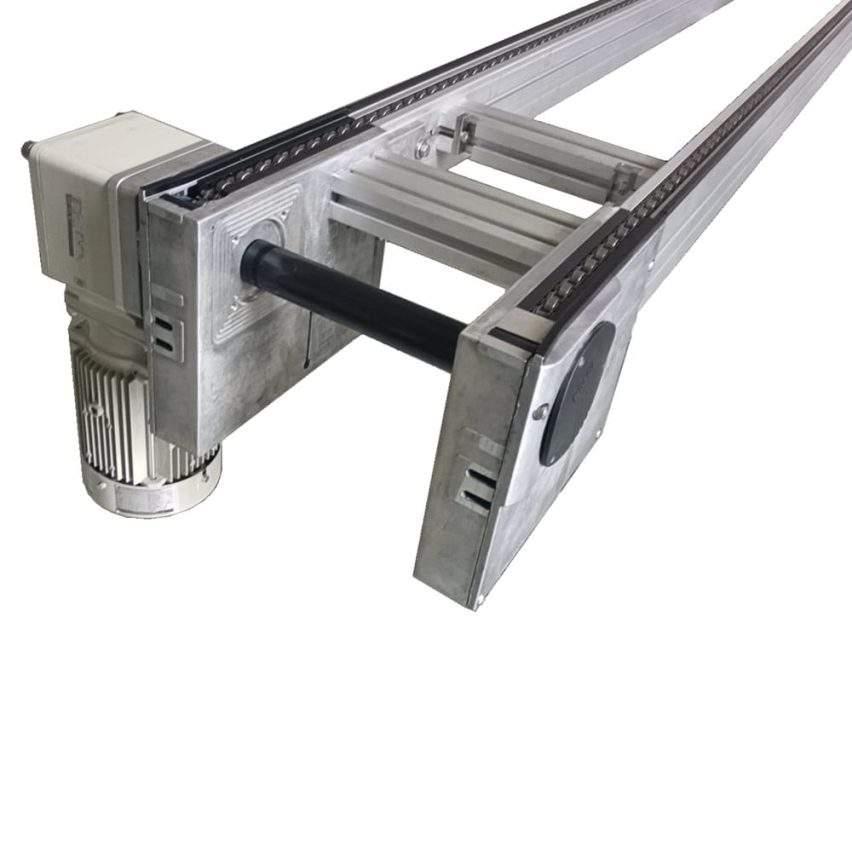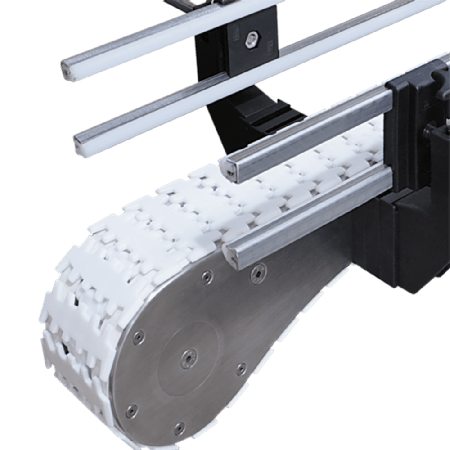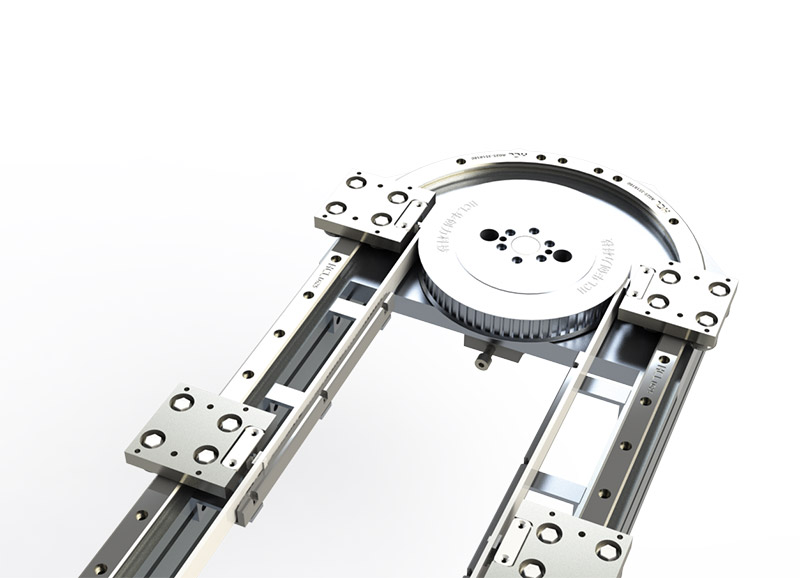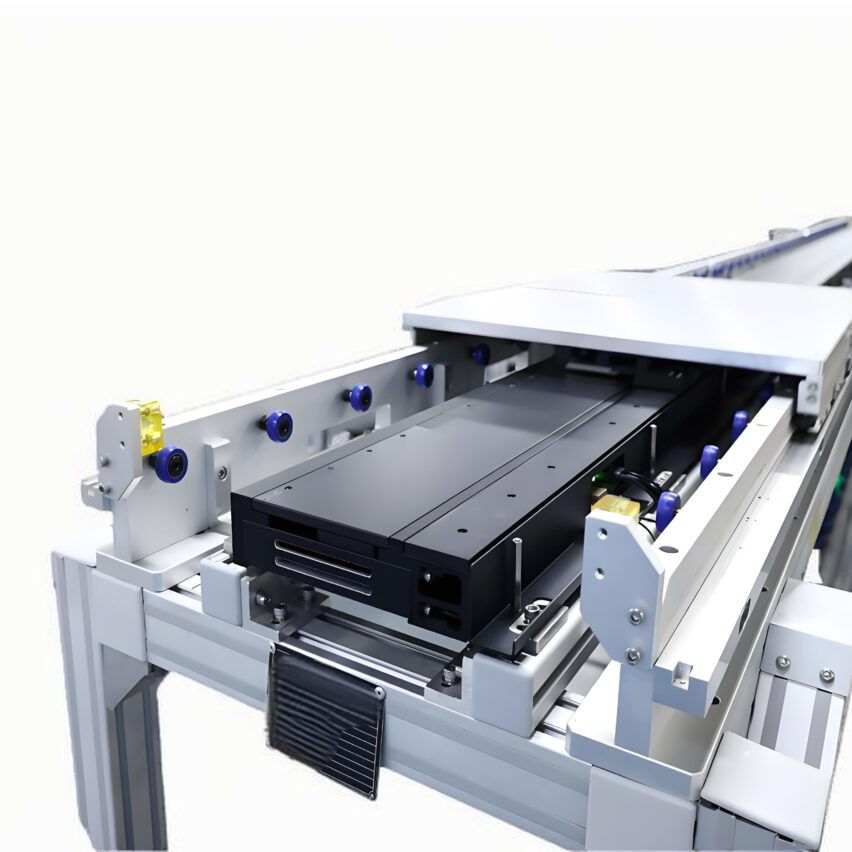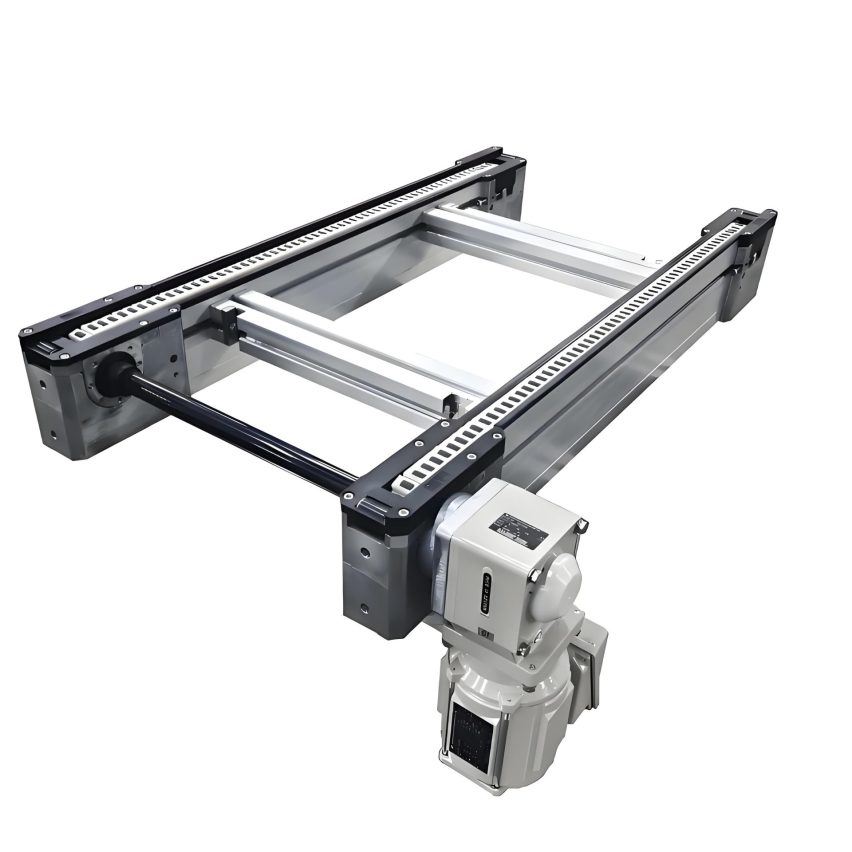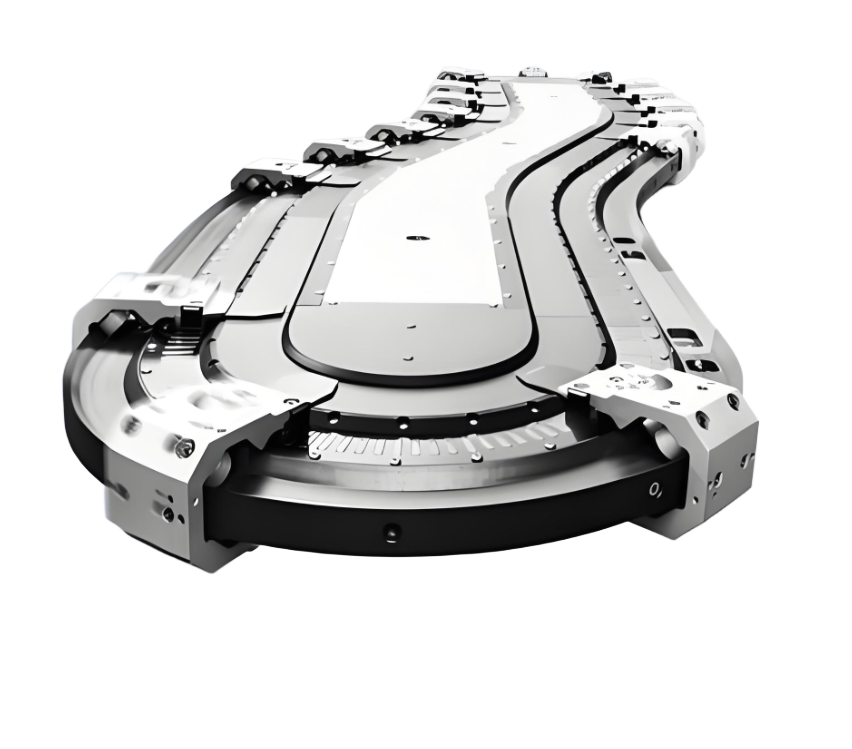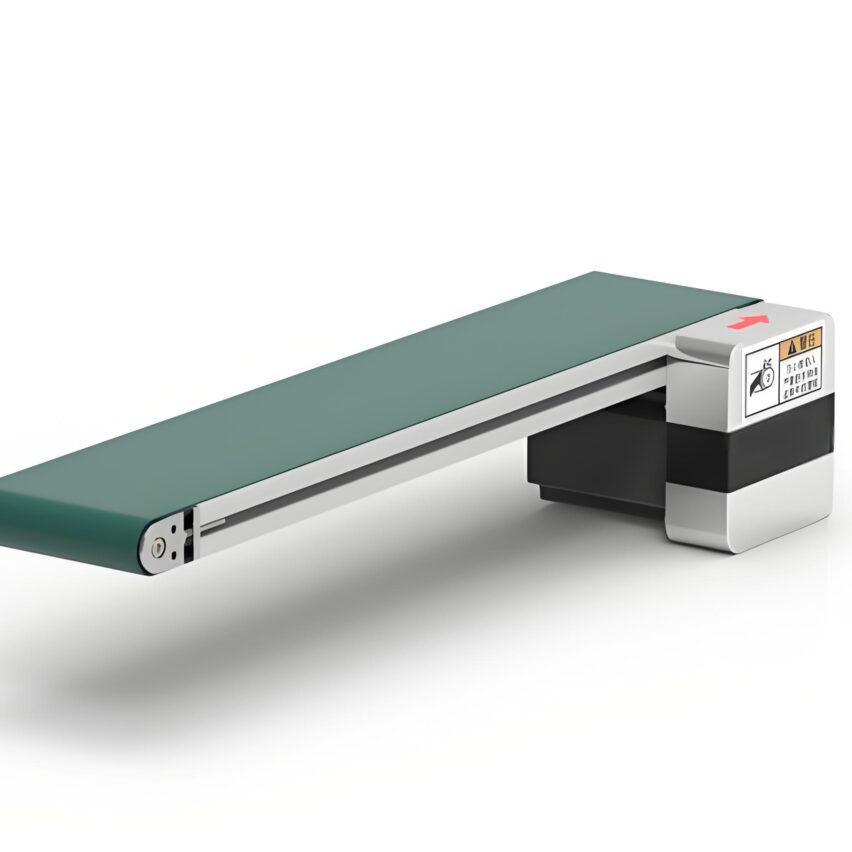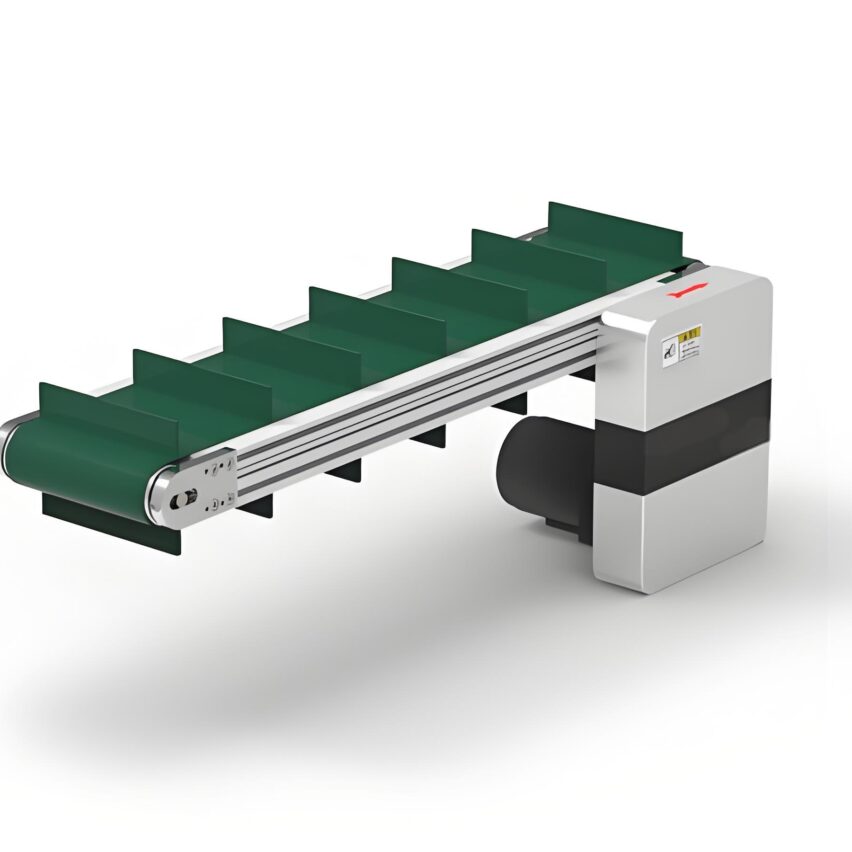I. Principle of differential transmission: the industrial evolution of the physical lever
The core technology of Shenzhen Speed Chain Assembly Line lies inPhysical leverage of the differential chain--When the outer chain roller (diameter D) and inner chain roller (diameter d) form a specific ratio (D>d), the actual speed of the work plate can be up to 2-3 times the speed of the chain (formula: Vtooling board
=Vcable length (= 1
×x(1+D/d)). This principle is translated into three major technological advantages by Shenzhen manufacturers:
- Precise accumulation controlThe friction drive generates a slip, and the work plate can be stopped at ±0.5mm precision position under the action of the stopper, providing motionless positioning for automotive engine assembly.
- triple growth rate architectureSingle-speed chain for basic transport, 2.5x chain for precision electronics assembly, 3x chain (differential chain) for unexpected orders.
- Ultra-quiet operationEngineered plastic rollers keep noise down to 30dB (equivalent to the sound of turning a book), much lower than the 60dB of traditional production lines.
An actual test by a mobile phone manufacturer in Shenzhen shows.3x speed chain makes burst order response more efficient by 40%At the same time, the product defective rate is pressed from 3% to 0.5%, which is exactly the dual empowerment of the differential principle on production efficiency and precision.
II. Scene Penetration: Conquest from 3C Electronics to Biopharmaceuticals
The competitiveness of Shenzhen Speed Chain Manufacturer comes fromDeep encapsulation of industry Know-HowThe company has demonstrated amazing adaptability in three major areas:
Consumer Electronics Battlefield
- Huawei supply chain companies use aluminium profile rails + anti-static work plates:
- Gold-coated conductive rows reduce contact resistance to 0.01Ω, avoiding electrostatic breakdown of the chip.
- Magnetic levitation guide to achieve ±0.001mm anti-shaking accuracy, to meet the needs of chip placement
- Daily production capacity increased by 120,000 units/line, compressed 30% lead time compared to traditional production lines
New Energy Vehicle Assembly
Subversive practices at BYD's Shenzhen base:
- Double-layer carbon steel frame with torsional modulus up to 980N-m/deg, carrying 150kg battery packs without deformation.
- Hydraulic buffer absorbs 80% impact kinetic energy, emergency stop displacement ≤ 0.5mm
- Hexagonal Honeycomb Layout Shortens Logistics Path 40%, AGV Dynamic OpeningsSub-logistics corridor
Biomedical Clean Revolution
- Three major breakthroughs in Myriad Medical's production line integration:
- Antimicrobial peptide-coated chainplates reduce bacterial adhesion rates by 98%
- -80℃ deep-cooling plate to maintain the temperature fluctuation of mRNA vaccine ≤±2℃.
- Protein activity sensor linked to emergency stop system, scrap rate from 181 TP3T to 2.31 TP3T
Third, the material game: aluminium profiles and special coating breakthroughs
While the industry is still lingering in the steel and aluminium debate, Shenzhen manufacturers have already advancedMolecular-level adaptation of materials to scenarios::
Lightweight Technology Matrix
- 40×80mm anodised aluminium rail: wire body weight reduction 40%, vibration amplitude pressure reduction 60%
- Carbon Fibre Tooling Plate: Eliminate Surface Scratches on 3C Products, Increase Yield by 22%
- POM engineering plastic chain plate: FDA 21 CFR Part 11 certified, compatible with aseptic environments
Heavy Duty Scenario Rigidity Revolution
- Changzhou Guangliang (Shenzhen Branch) Programme:
- Nitriding treatment on the tooth surface of the sprocket wheel improves wear resistance 300%
- Molybdenum disulphide solid lubricant coating: Maintenance-free intervals extended to 6,000 hours
- Silicon nitride ceramic coating: temperature resistance exceeding 500°C (engine assembly line scenario)
Environmental Materials Evolution
- Bio-based buffer cushion: carbon footprint reduction of 65%
- Photovoltaic drive system: covering 35% energy consumption, 102 tonnes of carbon reduction per year
- Recyclable aluminium profiles: 28% reduction in full life cycle material costs
IV. Intelligent control: from mechanical transmission to nerve centre
Competitive Focus Shifts to Shenzhen Multiplier Chain in 2025Data chain value density, forming a three-tiered evolutionary architecture:
Perceptual Layer Innovation
- Piezo-ceramic actuator: 0.01mm micro-pitch control through inverse piezoelectric effect
- RFID chip implantation: workpiece board tracking error <3cm, linkage with MES system to achieve full-process traceability.
- Temperature compensation algorithm: when the hydraulic oil temperature rise > 60 ℃, viscosity decay compensation accuracy of ± 1mm
Qualitative changes in decision-making
matlabmake a copy offunction optimizeSpeed(workstation_load, chain_speed) % Dynamic speed model (measured in a factory in Shenzhen) load_index = std(workstation_load)/mean(workstation_load). if load_index > 0.25 adjustBlockingTime(chain_speed*0.8); // Bottleneck Workstation Speed Reduction 20% else activateExpressRoute(); // Open AGV fast track end endThe algorithm enabled a 3C factory to increase daily production capacity by 120,000 units and OEE (Overall Equipment Effectiveness) jumped from 65% to 82%.
Executive level breakthroughs
- Servo motor + magnetic encoder: speed regulation accuracy up to 0.1m/min
- Pneumatic-hydraulic linkage damper: Absorb the kinetic energy of 150kg workpiece 80% impact.
- Mitsubishi PLC+PROFINET protocol: response delay <50ms
V. Green Manufacturing: The Symbiotic Logic of Energy Efficiency and Precision
Shenzhen manufacturers are reconfiguringA balanced formula for productivity and sustainability::
Energy consumption control technology
- Frequency-controlled motors: direct energy consumption reduction at no load 30%-40%
- Brake Energy Recovery System: Piezo Ceramic Conversion Efficiency of 18%
- On-demand lighting module: only the LED above the workstation is automatically lit, saving 24,000 kWh of electricity per year.
Closing the environmental value loop
- Ningde Times Shenzhen factory practice:
- Maintenance costs per metre of aluminium profile track are lower than carbon steel 67%
- Biocompatible Materials Waste Degradation Rate Increased 90%
- Reduced full life cycle carbon footprint by 42 tonnes/100m production line
Defence of the revolution
- Fibre-optic sensor warning: identifying link fatigue 48 hours in advance
- Cloud platform remote diagnosis: fault resolution efficiency 60% (24-hour response in Jiangsu, Zhejiang, Shanghai and Anhui)
- Self-lubricating links: maintenance intervals extended from 7 to 180 days
Exclusive Insight: The Paradigm Leap of Made in Shenzhen
After dismantling 23 production lines, I found that the frontrunner is turning industry logic on its head:
- Modularity inspires customisation: The 1,900 combinations of MISMI KRV guides derive from 23 anti-vibration constructions, proving that theStandardised interfaces are the basis for deep customisation
- Data solidification unleashes decision-making freedomBosch's Shenzhen plant solidifies 327 parameters but generates 1,900 scheduling scenarios -The more rigid the underlying protocol, the more it can support flexible production
- Service Response > Equipment Price: 24-hour fault response increases customer repurchase rate by 68%, confirming thatHardware vendors are transforming into production assurance service providers
Self-questions and answers about the Shenzhen speed chain assembly line
Q1: What is the essential difference between a differential chain and a multiplier chain?
Speed regulation mechanism determines scene boundaries::
- doubled speed chain: Speed factory-fixed (±2% fluctuation), suitable for steady beat scenarios (e.g. air conditioner assembly line)
- differential chain: Rolling mechanism supports ±15% dynamic speed regulation to cope with staff efficiency fluctuations (mandatory for daily capacity fluctuations >25%)
Key indicatorsNoise tolerance >65dB for differential chains, <50dB for doubled speed chains.
Q2: How to avoid smart upgrade pitfalls?
Shenzhen Super Power Electronics' "three-layer penetration" strategy:
- perceptual layer: Acquisition of only three parameters: displacement/pressure/temperature (cutting out the 82% redundant sensor)
- boundary layer: Completion of 95% real-time decision-making (circumventing cloud latency)
- protocol layer: Compulsory compatibility with PROFINET+Ethernet IP dual protocols
efficacy: 7x increase in data value density and 60% reduction in server costs
Q3: Winners and losers of future knockout rounds?
2026 Survival Tipping Point:
- material gene pool: ≥ 8 speciality coating technologies to be stocked (e.g. silicon nitride coating)
- energy threshold: Hundred metres of production lines with average daily power consumption > 220 kWh will be phased out by the carbon tax
- Protocol compatibility: Vendors unable to support OPC UA Unified Architecture will lose 60% orders
The Law of Survival: Carbon footprint <102 tonnes/year per kilometre of assembly line to become new benchmark for Shenzhen manufacturers

